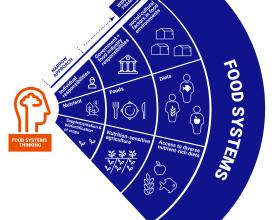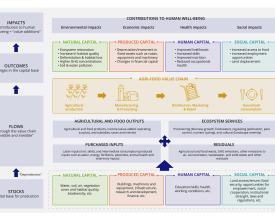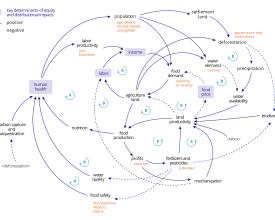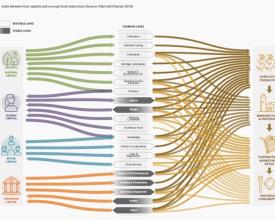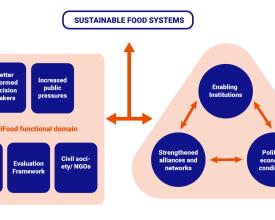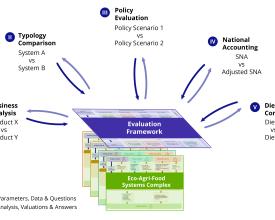
UN Environment’s TEEBAgriFood – The Economics of Ecosystems and Biodiversity for Agriculture and Food Initiative
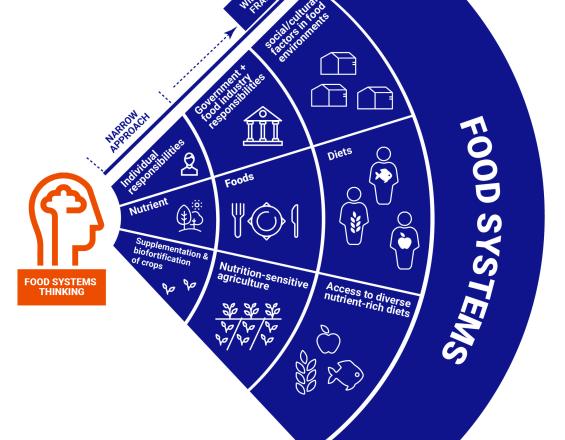
The TEEBAgriFood Initiative developed a unique comprehensive evaluation framework which allows assessing of impacts and externalities of agriculture and food systems – the environmental, health, social and cultural externalities, both positive and negative, and across value chains. It builds and illustrates the case for “systems” instead of “silo” thinking. This holistic approach of ‘true cost accounting’ allows decision makers to better compare different policies and the market to value agriculture and food more accurately. Thereby TEEBAgriFood will help to overcome barriers and effectively upscale agroecology and lead to more equitable agriculture and food systems. For its comprehensive approach providing opportunities to contribute to the majority of the SDGs and offering an effective system of ‘true cost accounting’, TEEBAgriFood was recognized with the Future Policy Vision Award 2018, awarded by the World Future Council in partnership with FAO and IFOAM – Organics International.
Context
Challenges addressed
Without transforming the way we produce energy, and the way we produce and consume food, international agendas such as the Paris Agreement or the 2030 Agenda will not be achieved. We need to substantially change the way we are producing, processing, distributing and consuming food, in order to achieve the Sustainable Development Goals (SDGs). However, most of the time many positive and negative externalities are not accounted for, making this fundamental transformation impossible. For instance, agricultural productivity is typically measured by yield per hectare, a simplistic metric that provides an incomplete picture of the true costs and benefits associated with agriculture and food value chains. This calls for a holistic, effective system of ‘true cost accounting’ as offered by the TEEBAgriFood Framework.
Location
Process
Summary of the process
With the right Objectives (BB1) and assumptions, the Development of TEEBAgriFood (BB2) could begin and develop TEEBAgriFood’s Evaluation Framework and methodologies (BB3). The result - TEEBAgriFood’s Evaluation Framework - can now unfold its Potential as a Transferable Model (BB4).
Building Blocks
Objectives
TEEBAgriFood is a systems approach for bringing together the various disciplines and perspectives related to agriculture and food, a framework for evaluation that supports the comprehensive, universal and inclusive assessment of eco-agri-food systems, a set of methodologies and tools for the measurement of positive and negative externalities, and a theory of change to help integrate TEEBAgriFood into the wide landscape of platforms and initiatives, like the SDGs, that are tackling these complex issues. It therefore plays a crucial role in the transformation of food and agriculture systems.
Enabling factors
TEEB has three core principles:
- Recognizing that the externalities of human behaviour on ecosystems, landscapes, species and other aspects of biodiversity is a feature of all human societies and communities.
- Valuing these externalities in economic terms is often useful for policy-makers and business stakeholders in reaching decisions.
- Managing the externalities involves the introduction of mechanisms that incorporate the values of ecosystems into decision-making through incentives and price signals.
Lesson learned
Dedicated to uncovering the hidden costs and benefits, i.e. the negative as well as the positive externalities of agriculture and food, the beneficiaries of TEEBAgriFood are diverse, ranging from consumers to smallholder farmers. Stakeholders are policymakers, researchers, farmers, consumers, businesses, investors, the funding and donor communities.
Development of TEEBAgriFood
TEEB, known for its pioneering research on the economic values of nature in 2010, brought together more than 150 experts from 33 countries to deliver a strong and urgent message to the global community on the need for a transformation of our agriculture and food systems that is sustainable, equitable, and healthy. The TEEBAgriFood initiative brings together scientists, economists, policymakers, business leaders, and farmers’ organizations to agree on how to frame, undertake and use holistic evaluations of agricultural systems, practices, products, and policy scenarios against a comprehensive range of impacts and dependencies across food value chains.
Enabling factors
TEEBAgriFood is hosted by The Economics of the Ecosystems and Biodiversity (TEEB) Office at the United Nations Environment Programme (UN Environment). The Global Alliance for the Future of Food, the European Commission, and the Norwegian Agency for Development Cooperation support the initiative.
Lesson learned
As a result of interdisciplinary collaboration, TEEBAgriFood goes beyond the original TEEB in that it seeks to be inclusive of externalities that are not typically included in environmental economics. This includes the social externalities, cultural externalities and health-related externalities of food systems, both negative and positive (the stocks of eco-agri-food systems comprise four different “capitals” – produced capital, natural capital, human capital and social capital – which underpin a variety of flows encompassing production and consumption activity, ecosystem services, purchased inputs and residual flows).
TEEBAgriFood’s Evaluation Framework and methodologies
TEEBAgriFood’s Evaluation Framework answers the question: What should we evaluate about food systems? And TEEBAgriFood’s methodologies answer the question: How should we do these evaluations? TEEBAgriFood illustrates five families of applications to compare: (a) different policy scenarios; (b) different farming typologies; (c) different food and beverage products; (d) different diets/ food plates; and (e) adjusted versus conventional national or sectoral accounts.
Enabling factors
TEEBAgriFood gives ten examples showing how to apply this framework and methodologies for various types of evaluations. One of them is, for example, a study in New Zealand of 15 conventional and 14 organic fields that valued 12 ecosystem services and found both crops as well as other ecosystem services to be higher in the organic fields.
Lesson learned
The TEEBAgriFood evaluation framework provides a structure and an overview of what should be included in the analysis. However, methods of valuation depend on the values to be assessed, availability of data, and the purpose of the analysis. Ideally one should be able to say with some confidence what are the externalities associated with each euro or dollar spent on a given kind of food, produced, distributed and disposed of in a given way. The application of the framework requires an interdisciplinary approach, where all relevant stakeholders, including policy-makers, businesses, and citizens, understand and identify questions that are to be answered by a valuation exercise. Therefore, stakeholder engagement across sectors is critical to the effective application of TEEBAgriFood in specific contexts and policy arenas.
Potential as a Transferable Model
Funds have been secured to apply the TEEBAgriFood Evaluation Framework in various contexts at the country level in Brazil, China, Colombia, Ethiopia, Ghana, India, Indonesia, Kenya, Malaysia, Mexico, Senegal, Tanzania and Thailand. Across Senegal, Tanzania, Ethiopia and Ghana, the application will feature a regional narrative with national case study examples on agricultural systems, practices, products, and policy scenarios, with the overall aim of contributing to the 2030 Agenda for Sustainable Development and a wide range of SDGs. In Brazil, China, India, Indonesia, Malaysia, Mexico, and Thailand, the application of the TEEBAgriFood Initiative aims to protect biodiversity and contribute to a more sustainable agriculture and food sector with a view to moving towards a level playing field by avoiding unfair competition through low environmental standards.
Enabling factors
- With the support of donors and through the take up by governments, private sector etc., the TEEBAgriFood Initiative will unfold its full impact.
Lesson learned
The foundations of the work plan will be based on an internationally agreed methodological framework, introduced in the G8+5 context by the EU, addressing the economics of ecosystems and biodiversity. It will bring together governments, business and other key stakeholders from civil society to implement activities aimed at influencing decisions and behaviours in participating countries. It will be the first time that the methodological framework developed by TEEB will be applied to an industrial sector (the agri-business sector) across the entire value chain of that sector, assessing scenarios with a view to promote change.
Impacts
Even though the concrete impact of TEEBAgriFood is to date limited, it is path-breaking as it is the first time that all wider benefits and costs associated with all relevant dimensions of the eco-agri-food value chain have been presented in one single report. As it is clear that only after we have recognized and demonstrated the value of what is being lost, our responses – be they policy responses, business responses, or citizens responses – will adapt, TEEBAgriFood’s influence on future research and decision-making cannot be underestimated.
TEEB first achieved global recognition in 2008, when officials from 13 of the world’s largest economies (the G8+5), commissioned the first-ever global analysis of the economic benefits of biological diversity and the costs of its loss. TEEBAgriFood is one of two most ambitious applications of TEEB. The Interim Report presenting the TEEBAgriFood Evaluation Framework was launched in 2015 at UNFCCC COP 21, with the Exploratory Studies released individually between autumn 2016 and spring 2017. The Global Alliance for the Future of Food, presented the underpinnings of the framework at key international events.
On 4 June 2018, the Scientific and Economic Foundations Report was released, welcomed by a number of eminent people, including Erik Solheim, Pavan Sukhdev, Alexander Müller, as well as by stakeholders from international organizations.
Beneficiaries
In order to improve and secure our eco-agri-food systems and, in particular, to mitigate their negative impacts, all stakeholders including governments, businesses, farmers and citizens, need to be aware of them.
Sustainable Development Goals
Story

Dr. Haripriya Gundimeda, Indian Institute of Technology Bombay says: As a Professor of Environmental Economics in India, I have been closely involved with 'The Economics of Ecosystems and Biodiversity' (TEEB) for the past several years. TEEB for Agriculture & Food has been particularly eye-opening for me, as a researcher, as it sheds light on the complex, deeply intertwined and often invisible linkages between agriculture and food systems and human well-being.
As a result of the TEEBAgriFood reports, I have picked up the charge to apply the systems approach and comprehensive Framework to an example that is close to home for me: the rice-wheat value chain in Punjab. In this region, there is a short timespan between rice harvest and preparing the fields for growing wheat. When you add the lack of economically viable alternative harvesting technologies, it creates significant externalities in the form of air pollution due to burning rice stalks, harming the health of not only local citizens, but those in surrounding Indian states. At the same time, policies that mandate the blending of biofuels with oil creates even more damage that goes unaccounted.
When speaking of national accounting, in fact, our indicators fail to ignore the depreciation of soil assets and wrongly indicate an increase in economic growth, as fertilizers and pesticides are increasingly used, and the chemical sector experiences value addition. It is important, therefore, that we connect all of these dots and plug any loopholes in current economic thinking. I plan to use the TEEBAgriFood Framework to reflect a wider systems approach of these policies and agricultural practices, to illustrate their unintended impacts and hidden costs.

